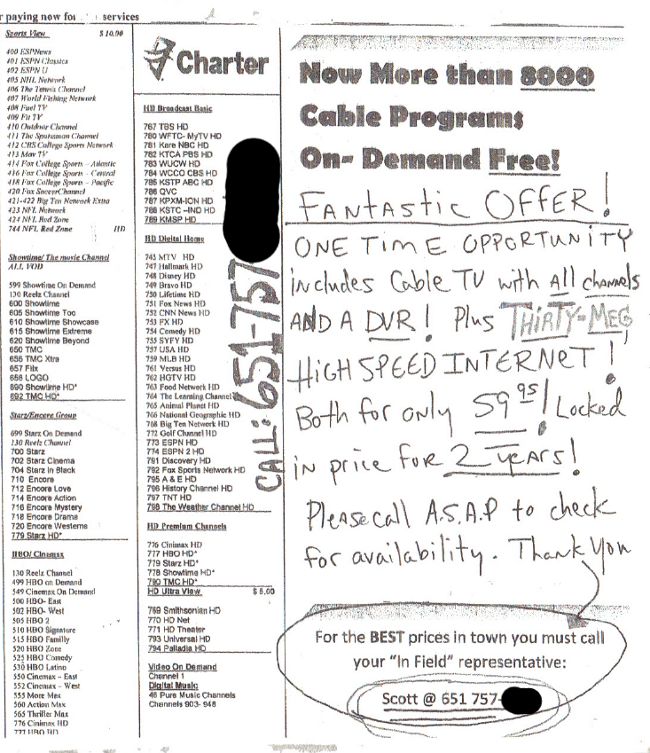
Fast, affordable Internet access for all.


As the Georgia legislature considers HB 282, a bill that will restrict local governments from investing in telecommunications networks, we are continuing coverage of the communities that will be harmed by passage of the legislation.
Should the restrictions become law, existing networks will not be able to expand. No expansion means fewer opportunities to reap the benefits that flow naturally from community networks. While this means few residents will receive access in places like Thomasville and Moultrie, it also means fewer businesses will receive access in places where networks exclusively serve commercial customers and government offices.
LaGrange's IT Director, Alan Slaughenhaupt, told us a little about its municipal network that began in 1996. The community decided to build its own network when no private provider would. The first goal was to get the K-12 schools connected. Bonds funded the network build out and were paid off within five years. At the time, the city partnered with ISN (Later Earthlink) to get the schools connected. LaGrange now partners with Charter Communications to bring connectivity to students.
The LaGrange network now connects hospitals, most city, county, and state government facilities, and provides connectivity for businesses. Alan describes how a T1 connection cost local businesses $2,300 per month in 1996. Now, thanks to competition created by the community owned network, local businesses can pay just $100 for a connection with better capacity. The municipal network serves about 400 commercial customers.
Alan explained that the automaker Kia moved a manufacturing facility near LaGrange in 2009 that used Just-In-Time inventory control. It needed a high-speed connection between the main plant and suppliers that LaGrange could deliver.
Investors don’t think too highly of the company either. Charter reported a wider third-quarter loss in November, losing $87 million compared with $85 million lost during the same quarter last year. Executives tell Wall Street the company was in chaos before new management under Tom Rutledge took over operations. Rutledge’s priorities are to invest in new set top boxes, convert more of its systems to digital, raise prices on services, cut back on promotions and retention offers, and centralize customer support operations.Imagine that! When communities have to make investments and suffer losses, they are accused of failing. Charter is losing money (and recently emerged from a bankruptcy proceeding) and trying to make changes to correct its condition. This is what happens to many firms in telecommunications. Only when it happens to those that are owned by communities, they are besieged with claims that such a situation is somehow proof that the public cannot own and operate networks. Note that others, like Comcast, are actually lauded by Wall Street for operating in areas with so little competition that they can increase their rates at will -- hard not to make a profit in that case. Which is precisely why existing cable and DSL companies push laws to restrict local authority to build better networks.
We have followed events in Opelika's network project for almost two years. In addition to creating a smart-grid for its municipal electric utility, the City plans to offer triple-play services. We previously covered Charter Cable's astroturf campaign to oppose the network and how the campaign failed when Opelikans passed the referendum.
This week, the 27,000 residents of Opelika saw their efforts begin to materialize at a ground breaking ceremony at the site of the new Opelika Power Services Facility. Chris Anthony, of the Opelika-Auburn News covered the story:
Site work is well under way on the $3.7 million facility, which leaders say will be an integral part of the fiber-optic network being built throughout the city. In addition to housing the administrative office and warehouse, the facility will also be the home of Opelika Power Services’ fiber hub.
Mayor Gary Fuller notes how the people of Opelika entered the business of municipal utilities over one hundred years ago, when the community purchased the then-private electric utility. He spoke about how the people of Opelika carry on that self-reliant streak with their new fiber network.
According to, Beth Ringley, Interim Director of Opelika Power, 90% of the fiber is installed underground throughout the city and should be nearly completed by the end of the summer. The $41 million project is scheduled for completion in the spring of 2013 and the first customers are expected to connect at that time.
Two videos offer further coverage of this new community network. These videos are no longer available.“It’s a big, big day for the city of Opelika,” Mayor Gary Fuller said. “It’s important for our future.”
City administrator Jeff O'Neill said that the city has no intention of abandoning FiberNet's 1,700 customers, including about 130 businesses. "This system isn't going anywhere," he said. "We're not going out of business." Despite the problems, he said the city has one of the fastest Internet systems in the country that has driven down prices and improved services by providing competition.The article also notes that prior to the City-owned network, the telephone company (TDS) provided very poor DSL service that was harming area businesses with slow and very unreliabile phone and broadband services. Without FiberNet Monticello, we don't know how many businesses would have been forced to relocate to be competitive in the digital economy. We decided to dig a little deeper to get a sense of what Monticello has received for its investment and difficulty. We previously examined the prices charged by Charter cable in town and found that households taking that deal were saving $1000/year.
 We also noted that Charter was almost certainly engaging in predatory pricing. After talking with other networks, we would guess that Charter is losing between $30 and $50 (conservatively) per subscriber per month.
We also noted that Charter was almost certainly engaging in predatory pricing. After talking with other networks, we would guess that Charter is losing between $30 and $50 (conservatively) per subscriber per month.According to the friend, Glenda Dillashaw, a Charter representative told her that Spain would need to find his cable box or be charged $212 for its loss.Fortunately, when Spain followed up with Charter after receiving another bill, the representative told him not to worry about it, suggesting that either Charter has an ambiguous policy to deal with it or Spain found a customer support person who's heart had not yet been crushed by soul-numbing job of being a customer support representative for a massive cable company. At least one other company has a formal policy in place for these situations:
Bright House Networks, whose service area includes hard-hit Pratt City, also expects its customers to file claims under homeowners' or renters' insurance to pay for lost or destroyed cable boxes. "That's how we normally handle it," spokesman Robert L. Smith said.Fascinatingly, an article in Michigan claims Comcast does not have a policy in place for these situations. Following recent tornados in Michigan, Comcast customers who lost their homes were given the option of paying a cancellation fee or paying a reduced "vacation" rate for a service they could not use.

Katherine Pfeiffer and Kathy Crawford soon found that residents were being told that they would be responsible for damaged or lost cable boxes and modems. Initially residents were told their accounts with Comcast would be put on “vacation” status, where a monthly fee of between $15 and $20 would be charged.Comcast is supposedly "working on a solution" for these people. The hubris of this massive companies is unreal. People who are waiting to hear if their home is repairable or has to be destroyed should not be confronted by the cable company with exorbitant fees.
 Download a higher resolution PDF here.
Charter has taken a package for which it charges $145/month in Rochester, Duluth, Lakeville, and nearby Buffalo (MN) and is offering it for $60/month - price guaranteed for 2 years. A Monticello resident supplied us with this flyer, which this person had received multiple times at their home over the course of a month. (See below for the full flyer).
Download a higher resolution PDF here.
Charter has taken a package for which it charges $145/month in Rochester, Duluth, Lakeville, and nearby Buffalo (MN) and is offering it for $60/month - price guaranteed for 2 years. A Monticello resident supplied us with this flyer, which this person had received multiple times at their home over the course of a month. (See below for the full flyer).
 This is either predatory pricing or the cable industry is out of control with its rate increases. If that package costs Charter more than $60/month to supply, then it is engaging in predatory pricing to drive competitors out of the market. Consider that Charter may be taking a loss of $20/month ($240/year) from each household that takes this offer.
This is either predatory pricing or the cable industry is out of control with its rate increases. If that package costs Charter more than $60/month to supply, then it is engaging in predatory pricing to drive competitors out of the market. Consider that Charter may be taking a loss of $20/month ($240/year) from each household that takes this offer.